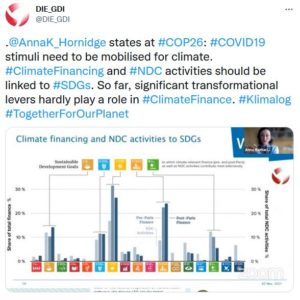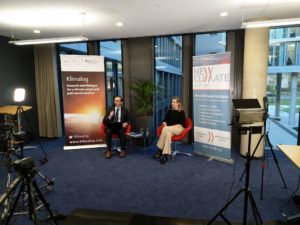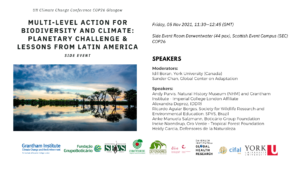DIE at COP26: DIE’s delegation engaged in discussions at the very heart of the global climate agenda. The debates focused on international cooperation on climate action and sustainable development.
After the COVID-19 imposed hiatus of 2020, the world eagerly awaited the Glasgow climate change conference, technically the 26th Conference of the Parties (COP26) to the UN Framework Convention on Climate Change (UNFCCC), to get global climate governance back on track. COP26 convened in a hybrid format – virtually and on site in Glasgow – from 31 October to 13 November 2021.
As in previous years, the German Development Institute / Deutsches Institut für Entwicklungspolitik (DIE) as an accredited observer organisation closely monitored COP proceedings and actively contributed to numerous side events, workshops and dialogue formats throughout COP26. Represented by DIE director Prof. Dr. Anna-Katharina Hornidge and researchers of the Klimalog project (“Klimalog: Research and dialogue for a just and SDG-compatible implementation of the Paris Climate Agreement”), DIE’s COP delegation engaged in discussions at the very heart of the international climate agenda and their implications for international cooperation on climate action and sustainable development. While COP26 itself yielded mixed results, DIE’s research-based contributions to public policy debates were generally well received and conducive to constructive dialogue between policy makers, development practitioners and fellow researchers.
Linking urgent short-term climate policies with transformative long-term strategies
Speaking on behalf of both DIE and the German Advisory Council on Global Change (WBGU), Prof. Dr. Anna-Katharina Hornidge made a strong case for linking urgent short-term climate policies with transformative long-term strategies in two distinct side events, i.e. in the EU Pavilion on 2 November and in the German Pavilion on 9 November. In her keynote “Long-Term Strategies: Priorities, Lessons and Opportunities for International Cooperation” she highlighted key insights of two recent studies published by WBGU and DIE respectively, “Beyond Climate Neutrality” and “Working together to achieve the Paris climate goals and sustainable development”.
 In particular, Prof. Dr. Anna-Katharina Hornidge elaborated how long-term strategy development needs to receive more attention within the international community, noting that the current focus on climate neutrality until 2050 serves merely as an intermediate balance-sheet target. She highlighted that climate stabilisation depends on total greenhouse gas emissions of all countries decreasing towards neutrality and on empowering decarbonisation pathways that maintain feasible options for CO2 removal. Accordingly, the WBGU stipulated three key demands for effective long-term strategies to achieve climate neutrality: (1) phasing out fossil fuels, (2) strengthening the carbon sink potential of the biosphere, (3) preparing institutional framework conditions and risk management systems for carbon removal technologies. To this end, Prof. Dr. Hornidge highlighted the COVID-19 stimuli packages as a unique opportunity for financing the respective measures while also addressing ecological and social challenges and advancing a transformation of the financial system.
In particular, Prof. Dr. Anna-Katharina Hornidge elaborated how long-term strategy development needs to receive more attention within the international community, noting that the current focus on climate neutrality until 2050 serves merely as an intermediate balance-sheet target. She highlighted that climate stabilisation depends on total greenhouse gas emissions of all countries decreasing towards neutrality and on empowering decarbonisation pathways that maintain feasible options for CO2 removal. Accordingly, the WBGU stipulated three key demands for effective long-term strategies to achieve climate neutrality: (1) phasing out fossil fuels, (2) strengthening the carbon sink potential of the biosphere, (3) preparing institutional framework conditions and risk management systems for carbon removal technologies. To this end, Prof. Dr. Hornidge highlighted the COVID-19 stimuli packages as a unique opportunity for financing the respective measures while also addressing ecological and social challenges and advancing a transformation of the financial system.
Achieving the Paris climate goals and sustainable development
In a further side event in the German Pavilion, Dr. Steffen Bauer, head of the Klimalog project, facilitated an international science-policy roundtable on the study “Working together to achieve the Paris climate goals and sustainable development: International climate cooperation and the role of developing countries and emerging economies” on 9 November (view record). Originally launched by DIE and NewClimate Institute during UN Climate Week, the event introduced the BMZ-commissioned study in the specific context of COP26. Following a keynote from Dr. Heike Henn (Commissioner for Climate Policy and Climate Financing, German Federal Ministry of Economic Cooperation and Development, BMZ), the study’s co-lead author Marie-Jeanne Kurdziel (NewClimate) highlighted in particular energy, cities, agriculture, forests and water as priority areas for promising climate action. Reflecting on ongoing COP26 negotiations, the roundtable participants – Dr. Heike Henn (BMZ), Dr. Shalini Sharma (Global Institute for Circular Economy & SDGs), Dr. Kennedy Mbeva (Africa Research & Impact Network) and Maria-José Poddey (GIZ) – discussed the implications of conceivable COP outcomes for international climate cooperation and the achievement of pertinent sustainable development goals (SDGs). One key takeaway from the ensuing debate was the need to strike a better balance between adaptation action and mitigation measures to ensure that climate policies also benefit those who are most vulnerable to climate change impacts.

Potentials of African-European Partnership
In a further side event on “Supporting green & climate resilient development: local to global insights on the AU-EU Partnership”, co-hosted by DIE with the European Think Tanks Group (ETTG) on 2 November in the EU Pavilion, Klimalog researcher Gabriela Iacobuta discussed the potential of AU-EU-Partnership with regard to ambitious climate action. Building on insights from the NDC-SDG Connections online tool, she underscored how African countries’ climate policies concomitantly contributed to achieving key SDG targets. The ensuing debate with African and European discussants focussed in particular on locally led approaches to mitigation and adaptation, green jobs and enterprises for youth and, crucially, on the potential of the AU-EU-Partnership to deliver on Agenda 2063 and Agenda 2030 respectively.
Investments into Ecosystem-based Adaptation
A UNFCCC side event that was co-hosted by DIE associate researchers Dr. Idil Boran (CIFAL, York University) and Dr. Sander Chan (Global Centre on Adaptation) focused on “Multi-level action for biodiversity and climate: Planetary challenge & lessons from Latin America” on 5 November. Convening a host of partners from research and practice, the event stressed the overlaps in solutions to climate and biodiversity crises and called for green recovery packages to invest into Ecosystem-based Adaptation. The event built on an extensive knowledge-exchange dialogue that had been jointly hosted by CIFAL and DIE in the immediate run up to COP26 on 20 and 21 October.
 Moreover, COP26 saw the establishment of a Working Group on Social Protection and Climate Change under the Universal Social Protection 2030 Global Partnership (USP2030). DIE researchers Dr. Mariya Aleksandrova and Dr. Daniele Malerba were actively involved in the initiation of this working group against the backdrop of their respective research.
Moreover, COP26 saw the establishment of a Working Group on Social Protection and Climate Change under the Universal Social Protection 2030 Global Partnership (USP2030). DIE researchers Dr. Mariya Aleksandrova and Dr. Daniele Malerba were actively involved in the initiation of this working group against the backdrop of their respective research.
Likewise, Klimalog researcher Andrew Deneault in cooperation with the UNFCCC Secretariat and international partners contributed to the Climate Action Measurement Data and Analysis (CAMDA) Resilience Working Group. They convened a stakeholder workshop in the UNFCCC’s Climate Action Lab on 6 November. Its aim was to facilitate the design, collection and analysis of resilience action by non-Party stakeholders and to further advance developing metrics and indicators to track progress in global adaptation action and resilience.

Schreibe einen Kommentar